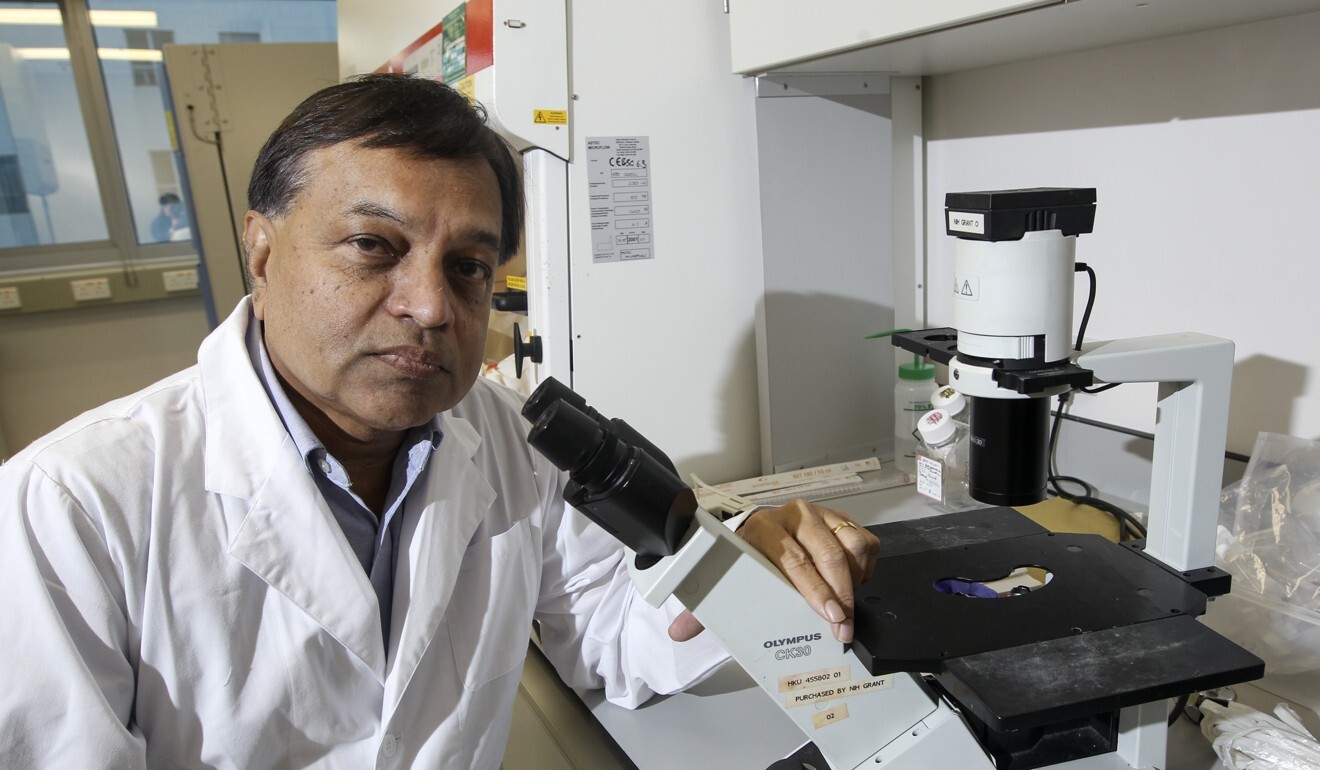
Coronavirus: virologist Malik Peiris says ‘absolutely not’ an outbreak at University of Hong Kong lab, as more than 300 tests at school net no positives so far
- Hours before city confirms six new cases, Peiris tells Post infection timeline suggests infected researcher ‘certainly acquired it in the community’
- But Centre for Health Protection says laboratory will still investigate its procedures and report findings to authorities
But the university would nevertheless take a hard look at its lab procedures and share the findings in a report to authorities, the Centre for Health Protection (CHP) said at an afternoon press conference, even as it acknowledged that environmental coronavirus samples taken at the facility were not highly transmissible.

More than 300 staff at the school have been tested in the wake of those findings, with nearly all returning negative results, though some remain pending.
“She had been on leave before [testing positive], so there was no more likely exposure in the lab,” Peiris said of the 28-year-old researcher. “She certainly acquired it in the community.”
A source in school management added the virus was found primarily in the office where she ate, while samples obtained from the pantry and buttons used to open doors had returned negative.
Peiris spoke to the Post about the situation just hours before the city confirmed six new Covid-19 infections on Monday, including four that were imported. The two local cases involved a family member of an earlier patient, and one whose infection could not be traced.
We have tested all these people, and everybody around that area … they were all negative
The total number of confirmed cases in the city now stands at 5,038, with 103 related deaths.
The centre on Sunday said that 41 workers at the HKU facility deemed close contacts of the researcher had been put under quarantine as 14 of 37 environmental samples taken in the work area came back positive.
Peiris confirmed that the researcher, whose infection was announced by the health authorities on Saturday, worked in his laboratory. But he believed she acquired the infection in the community rather than in the lab.
The virologist said the member of staff, who underwent weekly testing, had tested negative two weeks ago. She then took leave for a few days, returned to work in the lab last Monday, and went for a test on Wednesday, where the infection was detected.
He said even if the researcher had become infected at work, it was unlikely she would have tested positive just two days later.
Peiris said he had been out of Hong Kong for the past four weeks and was now in Sri Lanka.
Apart from the coronavirus, the lab, which operates under HKU’s school of public health, also conducts research into influenza viruses.
It is understood the facility is located on the sixth floor of the Laboratory Block on Sassoon Road in Pok Fu Lam.
When asked if there was a possible outbreak of the coronavirus in the lab, Peiris said, “absolutely not”.
“We have tested all these people, and everybody around that area … they were all negative,” he said, adding that the researcher’s viral load was low.
Second Covid-19 wave over winter ‘inevitable’ in China: infectious disease expert
The source from the school noted the researcher in question had not handled infectious materials in the past two weeks.
He also said that while the situation meant the conducting of research at the lab would be temporarily slowed, “essential services” would continue.
According to the CHP, specimens from the researcher’s workplace testing positive included those obtained from her chair, desk and computer mouse. Samples from some other chairs in the office area were also found to have the virus.
The evidence suggested the researcher had brought the virus into the workplace rather than becoming infected in the laboratory, said Dr Chuang Shuk-kwan, head of the CHP’s communicable disease branch.
“Judging from this distribution, the finding is compatible with the patient contaminating the environment … If the virus had come from the lab and contaminated the environment, usually the contamination would be spread more widely and not [concentrated] in the area she [might have] touched,” she said, adding the viral level of the samples taken was low.
More than 300 specimen bottles had been distributed to people working in the same building, Chuang said, confirming no positive cases had yet been identified. She added the office where the researcher worked had been closed for 14 days for disinfection.
He has also been granted government funding to conduct serological studies, as well as studies aimed at getting a better understanding of the antibody responses of Covid-19 patients, something that could contribute to vaccine development.
Among Monday’s six new cases, three were imported via arrivals from the Philippines, while one came from Togo. The locally infected case with no traceable source was a 60-year-old Filipino woman who works as a domestic helper at Tin Ching Estate in Tin Shui Wai.
Meanwhile, Professor David Hui Shu-cheong, a respiratory expert from Chinese University who advises the government on the pandemic, said there was a chance social-distancing measures could be further eased to allow up to six people per table at restaurants for the coming Mid-Autumn Festival.
Currently the number of people allowed to eat together or gather in public is capped at four.
“I believe the government will look at the situation, if there are no new outbreaks linked to restaurants and eateries and the local case numbers remain low, further relaxation could be possible,” Hui said.
Additional reporting by Lilian Cheng


